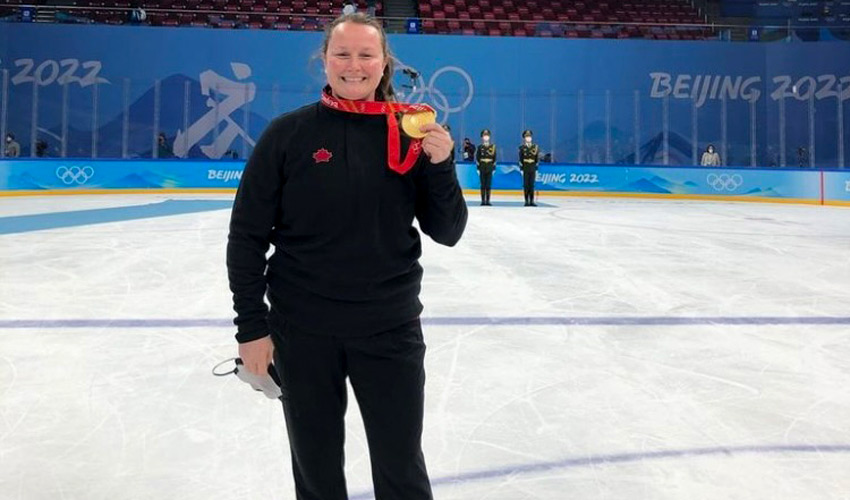MRU alumna strikes gold in Beijing
An Olympic experience to remember
— Mount Royal University | Posted: April 14, 2022

Christine Atkins is a Mount Royal University alumna and the athletic therapist for the Canadian women’s hockey team.
Would you believe it if we told you everyone on the women’s national hockey team had to take 150 PCR tests each between January 2021 and the end of the Olympics? According to MRU Bachelor of Health and Physical Education ― Athletic Therapy alumna and athletic therapist for Canada’s winning roster, Christine Atkins, it’s true.
There’s a lot that goes into preparing for the Olympics, Atkins says, and adding a pandemic into the equation introduces a whole other layer of logistics to manage. Having gone to the Games once before in 2018, Atkins shares how her experience at the 2022 Olympics was different, but still one to remember.
Players, coaches and staff centralized in Calgary roughly nine months before the Beijing Olympics started. During that time, there were several rivalry matches against the U.S., a major competition in Europe, games against the Junior A women’s team for extra play, and a pre-competition held a few weeks prior to the opening ceremonies.
Let’s not forget about the countless practices, skates and strength and conditioning training as well.
On any given day, Atkins’ job is managing previous injuries, working with the strength and conditioning coaches to determine a modified plan for injured players, providing treatment and assessing players for a safe return to practice or games. To say those nine months are busy would be an understatement.
In addition, everyone had to be fully vaccinated in order to play, show a negative test before boarding the plane and be re-tested after landing to be a part of the “closed loop” while they were in China. The closed loop was designed to keep the Olympic athletes, coaches, staff, Olympic committee and all of the volunteers separate from the rest of the city. Once they were there, everyone tested daily and stayed with their own team as much as they could.
According to Atkins, they had unlimited access to all of the sporting events but were only allowed to move between the event spaces and the three villages. Anywhere they went within the closed loop, they had to use the transportation shuttles provided or the team bus. Unlike in 2018, they couldn’t spend their free time being a tourist, exploring the city, trying new food or immersing themselves in the culture and community.
“In the grand scheme of things, from a high-performance standpoint, it was actually great because there were absolutely no distractions. You were forced to only think about the game and hang out with your team, coaches and staff.”
One of the biggest differences between 2018 and 2022 was the outcome. Having lost to the Americans in the 2018 Olympic gold-medal game, it was time for redemption. Atkins recalls the energy before the game being very calm. “Everyone was ready to do their job and fulfill their role. After the first shift, everyone settled in and there was no panic.”
When asked, “What is it like standing on the bench, watching the game? Is it hard to keep your composure?” Atkins shared she can’t control what happens in the game, but she tries to control her response.
“The entire bench staff does a great job of being even keel during the game,” she says.
When it comes to the gold-medal game, it all comes down to trust. The players put their faith in the coaches and staff to make sure they are ready to go. Once the puck is dropped, the coaches and staff have to believe in the players to go out and do what they do best.
The goal was to come home with the gold, and that’s exactly what they did.
Getting to walk in the closing ceremonies has been a twice-in-a-lifetime opportunity for Atkins. The first time was with a silver medal, but this time it was with gold. If given the chance to go to the 2026 Olympics, Atkins would definitely take the opportunity as she says she loves working in high-performance sports. But until then, Atkins plans to relax with family and friends, continue her case management work with Hockey Canada and treat the next generation of Olympic hopefuls.
